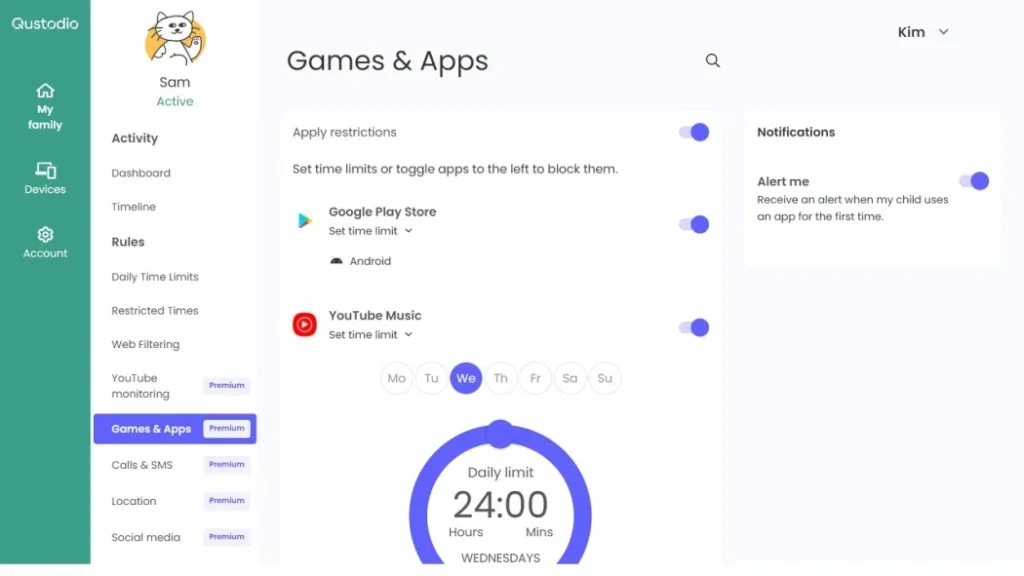Harmful sites parents: As a parent, you want to keep your children safe from harm, both in the physical world and online. However, in today’s world, it can be challenging to keep up with the latest apps and websites that pose a danger to your children. In fact, many harmful apps are disguised as innocent games or social media platforms, making monitoring your child’s online activity even more challenging. As a result, it’s crucial that you stay informed about the apps that pose the most significant risks to your child’s safety.
Why parents need to block harmful sites
As a parent, it’s essential to understand the importance of blocking harmful sites from your child’s devices. The internet is a vast and often unregulated space, and many dangers are lurking in the shadows. Children are particularly vulnerable to online predators, cyberbullying, and exposure to inappropriate content. Blocking harmful sites can help protect your child from these dangers and give you peace of mind when using their devices.
When children are browsing the internet, they may come across sites that promote violence, pornography, or other harmful content. These sites can be dangerous to your child’s mental and emotional well-being. Blocking these sites can help ensure your child is not exposed to inappropriate content that could harm their development. Additionally, blocking harmful sites can help protect your child from online predators looking to exploit them.
The most harmful sites for children
Countless sites on the internet can be harmful to children. However, some of the most dangerous sites promote violence, hate, pornography, and self-harm. The following are some of the most harmful sites that parents should be aware of:
TikTok
TikTok is a social media app that has become incredibly popular with young people worldwide, following different trends. While the app can be a fun way to create and share short videos, it can also be dangerous. There have been numerous reports of cyberbullying, sexual harassment, and grooming on the platform these last years. As everyone knows, TikTok’s algorithm is designed to keep users hooked by constantly feeding them an endless stream of content tailored to their preferences. This can lead to excessive screen time and decreased productive activities, such as homework or physical exercise.
Additionally, TikTok’s content moderation has been a subject of controversy, with instances of inappropriate and potentially harmful content slipping through the filters. Parents may worry about exposing their children to explicit language, violence, or dangerous challenges promoted on the platform. Also, TikTok’s emphasis on short-form videos encourages a superficial and often unrealistic portrayal of life, potentially impacting children’s self-esteem and body image. And last but not least, privacy concerns are prevalent, as TikTok collects large amounts of personal data from its users, including location information and browsing history. This raises concerns about data security and the potential misuse of sensitive information, making it an app that parents should block immediately.
Snapchat
Snapchat is another popular social media app that can harm children. The app is designed to allow users to send and receive self-destructing photos and videos. Snapchat’s disappearing messages can create a false sense of security, as recipients can still capture and distribute them. However, this feature can also share inappropriate content that could harm children. The app’s Snap Map feature raises safety concerns by sharing users’ locations. It can expose children to explicit content and contribute to addictive behaviour. Parents can protect their children from these potential risks by implementing restrictions or bans.
Omegle and Kik
Omegle and Kik are chat platforms that have been detected to be used by users of all ages. Both platforms allow users to chat with strangers anonymously from around the world. While the sites can be harmless, they can also be dangerous for children. While the apps are popular among teenagers, it’s also a prime location for predators looking to connect with children. They have also been criticized for their lax data privacy policies, which could put your child’s personal information at risk. There have been reports of predators using the site to target vulnerable children and engage in inappropriate behaviour.

4chan
4chan is an anonymous imageboard website that can be incredibly harmful to children. 4chan has gained a reputation for its unique culture and content, often featuring discussions and images that can be controversial, offensive, or inappropriate. Parents need to be aware of 4chan and its content, as it may not be suitable for children due to the potential exposure to explicit material, discussions promoting harmful behaviours, or toxic online interactions. Parents should consider exercising caution and implementing appropriate restrictions regarding their children’s access to platforms like 4chan.
Whisper
Whisper is an anonymous social media app allowing users to share secrets as anonymous messages and connect with other users. While the app is designed for users over the age of 17, there are no age verification measures in place, which means that children as young as 13 can use the app. Whisper is particularly dangerous because it allows users to remain anonymous, making it difficult to track down individuals who engage in harmful behaviour. The anonymous nature of the app can lead to inappropriate or harmful content being shared, including cyberbullying, harassment, or predatory behaviour. Furthermore, there is a lack of moderation and accountability on Whisper, making it difficult to ensure a safe and healthy online environment. Parents should be aware of these potential risks and consider monitoring their children’s app use or discussing appropriate online behaviour to help protect them from potential negative experiences.
How to block harmful sites on your computer and mobile devices
Blocking harmful sites on your child’s computer and mobile devices is crucial in protecting their online well-being. Fortunately, there are several effective ways to accomplish this. First, utilize the parental controls feature that comes built-in with most devices. These controls enable you to block access to inappropriate or dangerous websites, providing a basic level of protection. Another option is to employ a web content filter, which allows you to block specific sites or categories of sites. Using a web content filter ensures that your child can only access appropriate content online.
Additionally, consider using third-party software designed explicitly for parental control. These programs offer advanced features like time limits and activity monitoring. Qustodio is a comprehensive parental control software for various platforms, including Windows, Mac, Android, and iOS. Net Nanny and Norton Family are popular with features like web content filtering and activity monitoring.
In conclusion, taking proactive measures to block harmful sites, employing reliable parental control software, and having open conversations about online safety can help safeguard your child from online threats like cyberbullying and predators. Remember to stay involved and informed about your child’s online activities to ensure their online safety and security.



